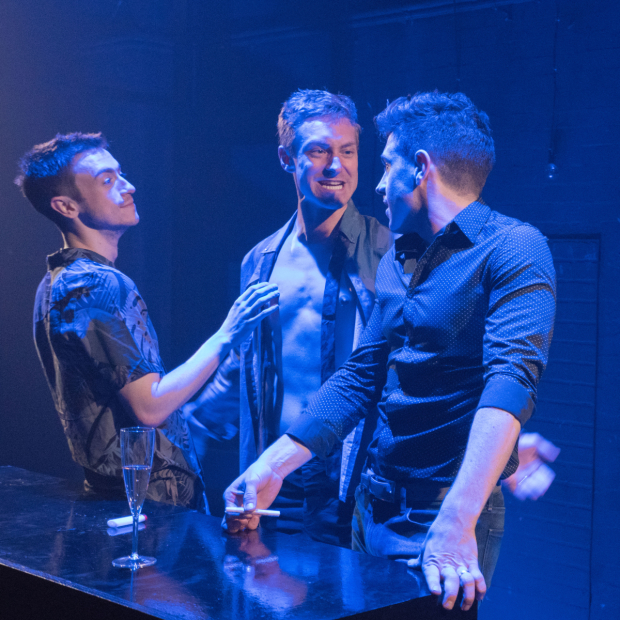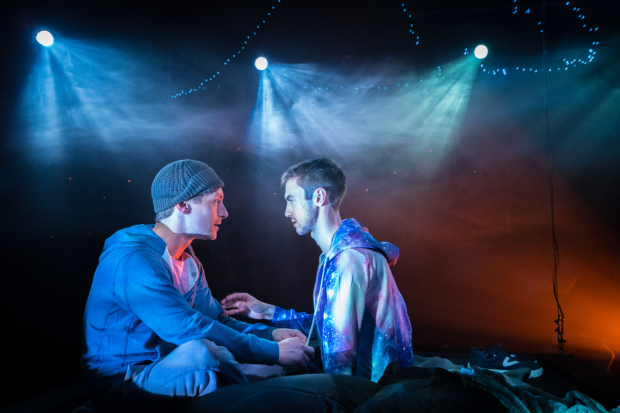Afterglow

(© Mati Gelman)
New York audiences recently got a gander at polyamorous relationships in Sarah Ruhl's How to Transcend a Happy Marriage, a play whose main character was new to the idea of experiencing extramarital sex. Not so with Josh and Alex, the gay couple at the heart of S. Asher Gelman's initially stimulating but ultimately flaccid play Afterglow, now running in the Loft at the Davenport Theatre.
Self-absorbed theater director Josh (Brandon Haagenson) and his sometimes high-strung husband, Alex (Robbie Simpson), have an open marriage. In their five years of matrimony, these twentysomethings have never had a problem with their arrangement (only rule: no sleepovers without each other). But after they have a threesome with a younger masseur named Darius (Patrick Reilly), Josh begins to spend more time with their new friend while Alex is off at school being a chemistry student. That development alone is enough to cause friction between the previously blissful couple, but they also have to think about their unborn baby (Josh, who comes from money, is fathering the couple's first child through a surrogate). As time goes by and the word "love" enters the equation, the three men begin to suffer the pangs of jealousy and betrayal, and they wonder whether a relationship between any of them will be possible again.

(© Mati Gelman)
Gelman's play (he also directs) begins with an arresting visual of a large bed completely shrouded by hanging sheets. We can sense three bodies behind this "curtain," illuminated by a purplish glow (lighting design by Jamie Roderick) while a low, monotonous tone throbs in the background (sound design by Alex Dietz-Kest). The atmosphere suggests a seedy sex parlor, especially when we hear grunts and moans coming from behind the sheets. Once the curtain drops, we see a trio of white men lying postcoital in the buff.
Gelman captures authentic-sounding dialogue in this opening scene as he parades his actors naked in front of the audience. Haagenson does a good job of balancing Josh's childish neediness with his manipulative urge to control the men in his life. As his put-upon partner Alex, Simpson plays a convincing third wheel. Reilly is the only one who's believably vulnerable, though, as the men exchange kisses and gaze into each other's eyes.
Unfortunately, the story becomes as predictable as a headache after a bender, and we wonder whether Afterglow is really about polyamory or just youthful self-delusion. These millennials don't suffer from jealousy as much as they do from the tyranny of excess. "Alex," says Josh as he tries to justify his extracurriculars with Darius, "we're young, we're hot, we're practically exploding with testosterone. We should be f*cking all of the time!" Have they forgotten they have a baby on the way? Haagenson, Reilly, and Simpson do their best to rise above the limitations of the script, but they can't overcome the fact that none of these characters is particularly interesting. It's difficult to feel anything for relatively well-off white men whose biggest problem is too much choice.
Of interest is Ann Beyersdorfer's jigsaw puzzle of a set, which has the surprising reveal of an onstage shower that provides opportunities for more gratuitous nudity. Fortunately, most of the play requires that the actors be clothed, and that's lucky for them. All three have to do a fair amount of physical labor as they take apart and reassemble different configurations of hefty boxlike chairs and mattresses between scenes. As a result, each scene change grinds the action to a halt for at least a minute or two. A more efficient design could have shaved precious time off the show's two hours and 10 minutes.
The most disappointing thing about Afterglow, though, is that it seems to promise and then fails to deliver a thoughtful discussion of polyamory. Gelman gives us a one-dimensional look at the destructiveness of selfishness and jealousy, but he doesn't tackle the question at hand: Can a gay polyamorous relationship like this actually work? In the end, the play leaves us not so much with an afterglow as an anticlimax.











